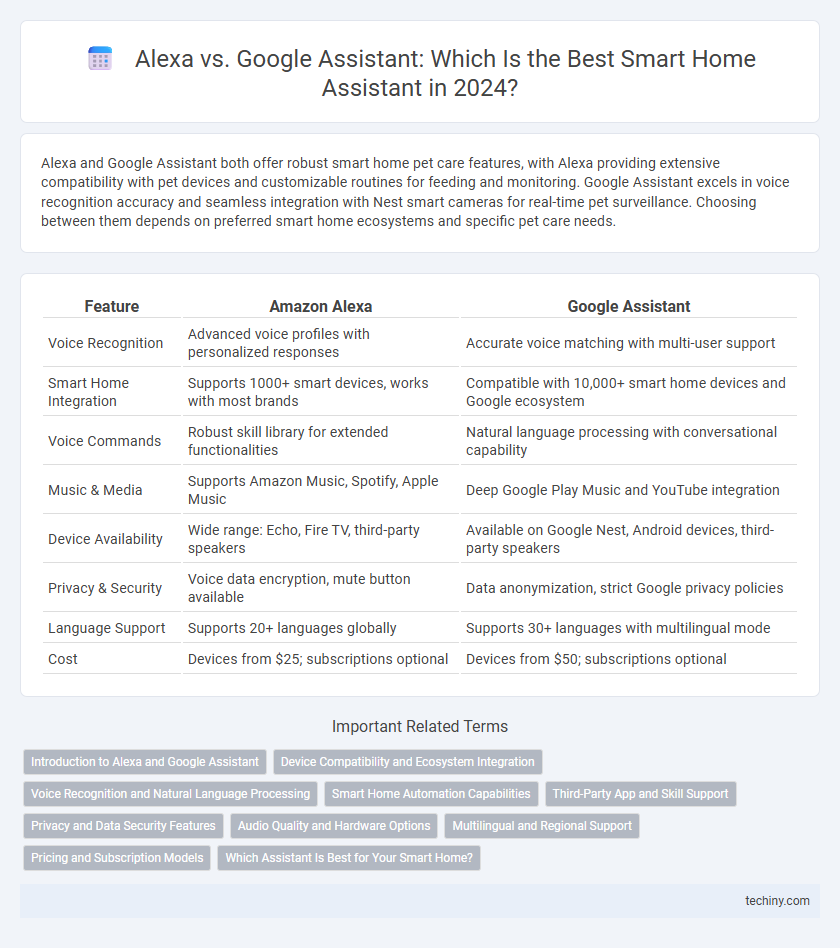Alexa and Google Assistant both offer robust smart home pet care features, with Alexa providing extensive compatibility with pet devices and customizable routines for feeding and monitoring. Google Assistant excels in voice recognition accuracy and seamless integration with Nest smart cameras for real-time pet surveillance. Choosing between them depends on preferred smart home ecosystems and specific pet care needs.
Table of Comparison
| Feature | Amazon Alexa | Google Assistant |
|---|---|---|
| Voice Recognition | Advanced voice profiles with personalized responses | Accurate voice matching with multi-user support |
| Smart Home Integration | Supports 1000+ smart devices, works with most brands | Compatible with 10,000+ smart home devices and Google ecosystem |
| Voice Commands | Robust skill library for extended functionalities | Natural language processing with conversational capability |
| Music & Media | Supports Amazon Music, Spotify, Apple Music | Deep Google Play Music and YouTube integration |
| Device Availability | Wide range: Echo, Fire TV, third-party speakers | Available on Google Nest, Android devices, third-party speakers |
| Privacy & Security | Voice data encryption, mute button available | Data anonymization, strict Google privacy policies |
| Language Support | Supports 20+ languages globally | Supports 30+ languages with multilingual mode |
| Cost | Devices from $25; subscriptions optional | Devices from $50; subscriptions optional |
Introduction to Alexa and Google Assistant
Alexa, developed by Amazon, integrates seamlessly with a wide range of smart home devices, offering voice-controlled automation, routines, and compatibility with over 100,000 smart home products. Google Assistant, powered by Google, excels in natural language processing and provides extensive integration with Google services, enabling personalized responses, smart device control, and contextual understanding. Both platforms support voice commands for lighting, thermostats, security systems, and entertainment, making them central hubs for managing connected home environments.
Device Compatibility and Ecosystem Integration
Alexa offers extensive device compatibility, supporting thousands of smart home products across lighting, security, and entertainment categories, making it ideal for diverse ecosystems. Google Assistant excels in ecosystem integration with deep connectivity to Google services like Nest, Chromecast, and Android devices, providing seamless voice control and automated routines. Choosing between Alexa and Google Assistant depends on whether priority lies in broad device support or cohesive integration within the Google hardware and software ecosystem.
Voice Recognition and Natural Language Processing
Alexa and Google Assistant both utilize advanced voice recognition technologies, but Google Assistant leverages Google's vast search and AI capabilities for more accurate speech-to-text conversion and context understanding. Google Assistant's natural language processing (NLP) benefits from continuous updates and deep integration with Google's knowledge graph, enabling nuanced responses and complex command handling. Alexa, powered by Amazon's proprietary NLP models, excels in smart home device interoperability and custom skill development, offering robust voice command recognition tailored to home automation.
Smart Home Automation Capabilities
Alexa offers extensive smart home automation capabilities, supporting over 100,000 compatible devices across numerous brands, enabling seamless control of lighting, thermostats, and security systems. Google Assistant integrates deeply with Google Home ecosystem, providing advanced routines and contextual automation through Google Nest products and third-party smart devices. Both platforms utilize voice commands and AI to optimize home automation, but Alexa's broader device compatibility and routine customization often give it an edge in diverse smart home setups.
Third-Party App and Skill Support
Alexa offers an extensive third-party app and skill ecosystem with over 100,000 available skills, making it highly versatile for smart home integration. Google Assistant supports a growing number of third-party apps but currently lags behind Alexa in sheer volume and variety of skills. This wide skill selection enables Alexa to seamlessly connect with a broader range of smart home devices and services.
Privacy and Data Security Features
Alexa and Google Assistant implement robust privacy controls, including voice recording deletion and activity history management, to enhance user trust. Google Assistant offers customizable privacy settings via the Google Home app, enabling users to control data sharing and ad personalization with precision. Alexa provides features like Voice ID recognition and the ability to disable microphones physically, ensuring heightened protection over personal data in smart home environments.
Audio Quality and Hardware Options
Alexa offers a wide range of devices with varying audio capabilities, from the budget-friendly Echo Dot to the premium Echo Studio, which delivers 3D audio and deep bass. Google Assistant is integrated into devices like Nest Audio and Nest Mini, prioritizing clear vocal output and balanced sound but with fewer high-fidelity options compared to Alexa. Both platforms support multi-room audio, yet Alexa's hardware lineup provides more choices for audiophiles seeking enhanced sound quality.
Multilingual and Regional Support
Alexa and Google Assistant both offer robust multilingual capabilities, with Google Assistant supporting over 30 languages and dialects, enabling seamless communication in diverse households. Google Assistant excels in regional language nuances and accents due to continuous updates from Google's extensive language data sets, enhancing understanding and response accuracy. Alexa supports multiple languages but has more limited regional dialects compared to Google Assistant, impacting its performance in localized smart home interactions.
Pricing and Subscription Models
Alexa devices typically offer a wide range of price points, from affordable Echo Dot models starting around $30 to premium Echo Studio units exceeding $200, with no mandatory subscription required for basic voice assistant features. Google Assistant is integrated into multiple devices like Nest Mini and Nest Audio, priced similarly from $40 to $100, and some advanced features may require a Google One subscription for enhanced storage and services. Both platforms support optional subscriptions for additional benefits, but Alexa often integrates with Amazon Prime services, providing unique value for Prime members.
Which Assistant Is Best for Your Smart Home?
Alexa offers extensive compatibility with over 100,000 smart home devices, making it ideal for users seeking broad integration. Google Assistant excels in natural language processing and contextual understanding, providing seamless interaction and smart routines. Choosing the best assistant depends on your existing devices, preferred ecosystem, and the level of voice control sophistication desired.
Alexa vs Google Assistant Infographic

 techiny.com
techiny.com